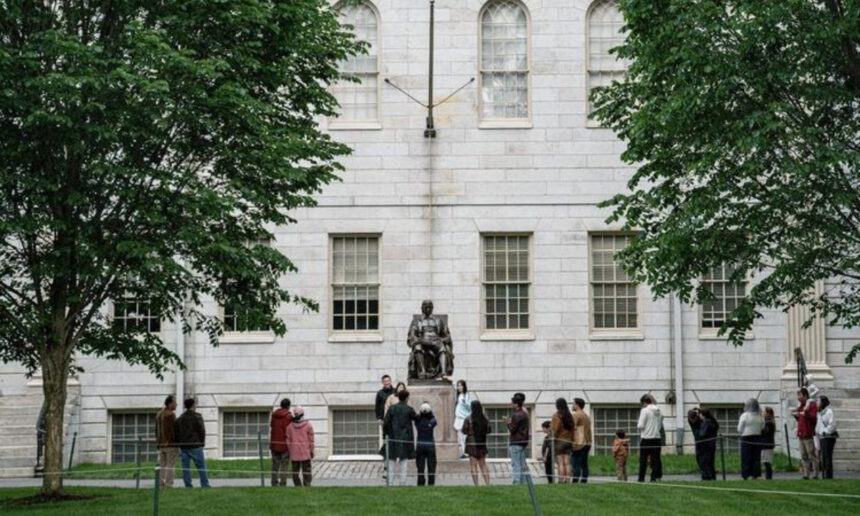By Zhang Han, Liang Rui and Zhang Changyue
The US government has ordered embassies and consular sections worldwide to stop scheduling new appointments for student visas as it prepares to expand social media vetting of such applicants, a move constitutes the latest blow to foreign nationals seeking to study in the US as incumbent administration tightens policies on universities and students, according to US media reports.
A cable obtained by Politico, dated Tuesday and signed by Secretary of State Marco Rubio, stated “Effective immediately, in preparation for an expansion of required social media screening and vetting, consular sections should not add any additional student or exchange visitor (F, M, and J) visa appointment capacity until further guidance is issued septel, which we anticipate in the coming days.” Politico explained that septel is State Department shorthand for “separate telegram.”
When asked to comment on the matter, Chinese Foreign Ministry spokesperson Mao Ning said on Wednesday at a press conference that “China believes that education cooperation and academic exchanges should not be disrupted. We urge the US to protect the lawful and legitimate rights and interests of all international students, including those from China.”
Embassies and consular sections were ordered to remove any unfilled appointments from their calendars for students seeking visas, those with appointments already scheduled could go ahead, the BBC reported.
The cable message did not directly specify what future social media vetting would screen for. The administration had earlier imposed some social media screening requirements, but those were largely aimed at returning students who may have participated in protests against Israel’s actions in Gaza, according to Xinhua News Agency.
The move could severely slow down student visa processing. It also could hurt many universities who rely heavily on foreign students to boost their financial coffers.
Though multiple students and international education consultants expect the suspension to be temporary, it has added to the policy risks of studying in the US and further strained the nerve of foreign students and scholars against the backdrop of funding cuts, State and Homeland Security departments’ revoke of visas from those already in the US, and ban on Harvard University from receiving international students, analysts said.
These US’ actions have dampened Chinese students’ interest in pursuing academic future in the country, once a top-notch destination for studying abroad. While students seek opportunities in other countries and regions, “eschewing US” could be a global trend that reshapes the global education landscape and can have profound impact on academic capacities, education industry insiders said.
Policy uncertainty
A Chinese graduate student studying at the University of Washington, who preferred to be identified as Stan, said “Graduate students are less affected as the offers are earlier and most have had visas or made appointments; undergraduate students face greater impact as admission decisions are still being finalized, and visa application has yet to start.”
A prolonged pause in student visa scheduling could cause delays that disrupt the enrollment plans of colleges, boarding schools, and exchange students for the summer and fall terms, and strain university budgets. Many institutions have relied on full-tuition-paying international students to offset reductions in federal research funding, according to Newsweek.
Another Chinese student admitted to a graduate program at Harvard University, which is in a legal battle with the US government, said although her visa appointment in early June has not been affected, the frequent changes in US policies, and the atmosphere of not welcoming foreign students, have sparked great concern among the incoming students including herself.
Eschewing US
Hannah He, a consultant who works for an overseas education consultation agency with multiple offices in China, told the Global Times on Wednesday that the agency has received inquiries from clients on the visa issue, and they expect the suspension to be temporary.
But the “psychological burden” on students and their families remains large. Students are supposed to be meeting friends and getting prepared, but the uncertain and unpredictable US policies have dampened their excitement for living and studying in a different country.
The latest row between Harvard and the US government has also been frequently discussed, which prompted one student of He, who majors in computer science, to decline an offer from Harvard and accept the olive branch of Carnegie Mellon University.
A Shanghai-based overseas education consultant surnamed Wang shared with the Global Times a common concern of their clients – their dream schools might also be affected and they ask: If Harvard is just the beginning, who will be the next?
He observed that given the overall uncertain and unpredictable US policies, students tend to apply for schools in other countries, or at least add backup universities outside the US.
A client of Wang raised worries about reputational damage or decline in rankings of American universities. Institutional prestige often correlates with a country’s overall standing, and given the current uncertainties surrounding US’s global standing, safety, and policies related to academia, “they’re reevaluating the cost-benefit of studying there,” Wang said.
Wang’s agency saw a 10 percent decline in inquiries about studying in the US compared to last year. “Most students are now opting to applying to multiple countries simultaneously rather than focusing solely on the US. Several agencies I’ve spoken with have also reported significant drops,” Wang said.
He’s agency saw a steeper drop in applicants for US schools. March and April are usually peak seasons for inquiry and signing of contracts, but the number of contracts for the US halved in April compared to last year, He said.
US policies targeting international students are set to have an economic consequence for the country itself as in 2023-2024 academic year, 1.1 million international students at US colleges and universities contributed $43.8 billion to the US economy and supported more than 378,000 jobs, according to nonprofit association NAFSA, the Association of International Educators.
A Chinese scholar at a top US university told the Global Times on condition of anonymity that canceled status of international students were resumed after lawsuits, the row involving Harvard can be settled, and the visa appointment will not be suspended forever, but impact of those policies would linger.
“Pessimism spreads, about the policies and academic future in the country,” the scholar said on Wednesday, adding that many of his colleagues, particularly foreign nationals, are considering opportunities outside the US, meaning their experiences and expertise will no longer benefit US institutions.













